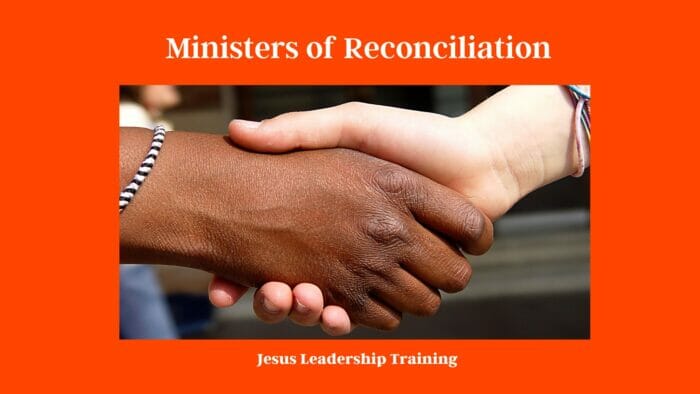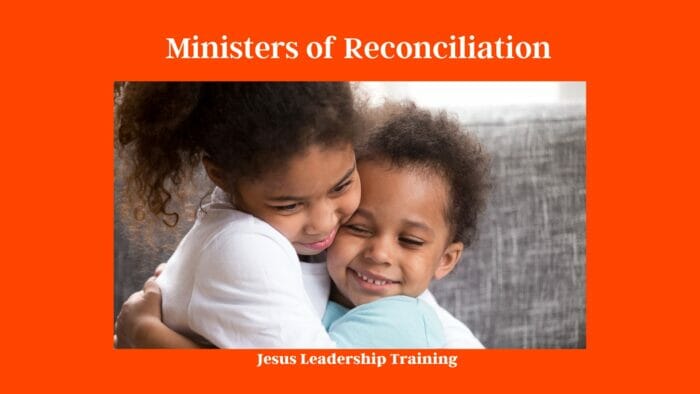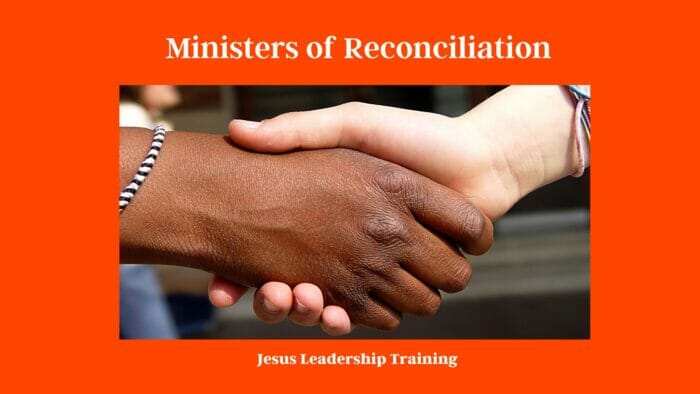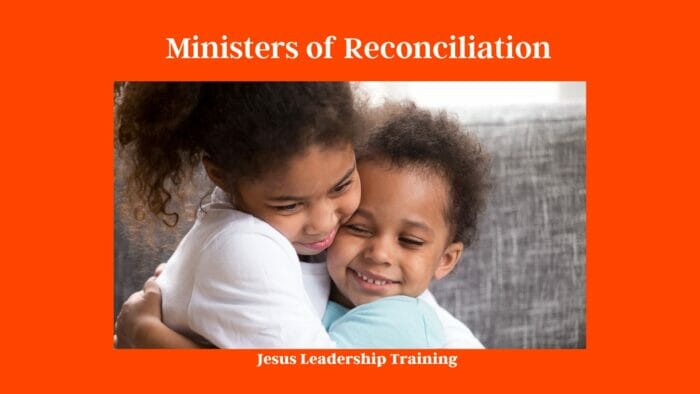Ministers of Reconciliation – The concept of reconciliation is as profound as it is grand. Embodied not just in religious teachings, but in the fabric of social interactions and human relationships, it serves as an integral force that drives peace, forgiveness and social justice.
It is within this framework that ministers of reconciliation operate. Undertaking a sacred responsibility, they strive to mend the fractures within societies and between individuals and their divine connection.
This essay aims to shed light on the ties that bind the concept of reconciliation itself, how it is taught in Christianity, the multifaceted role of ministers therein, and the practical implications of such teachings within contemporary society
Table of Contents
Ministers of Reconciliation: Understanding Reconciliation
Reconciliation is a multifaceted concept with roots in various sectors of human life, including but not limited to religion, sociology, and even politics. At its core, reconciliation involves the process of restoring broken relationships or resolving conflicts, disagreements or misunderstandings. It has profound implications for social cohesion, peace-building, and justice in societies marred by conflict or divisions.

From a societal perspective, reconciliation is a holistic process involving multiple stakeholders and requiring collective efforts. It interconnects with forgiveness, a voluntary and individual process of letting go of resentment or revenge toward someone who has inflicted harm.
The harmony between reconciliation and forgiveness cultivates peaceful coexistence and promotes social justice by mending social fissures and bridging gaps in society.

As for peace, reconciliation acts as a guarantor, helping to extinguish the flames of conflict by addressing root causes and establishing healthy channels for interaction and dialogue.
This directly ties reconciliation to social justice, as it endeavors to correct injustice, address power imbalances, and restore rights, ensuring everyone in society is treated fairly and respects others.
The Function and Influence of Reconciliation Ministers
Reconciliation ministers fulfill an extraordinarily vital role. Acting as intermediaries, peacemakers, and advocates for social justice, they are unique figures in the process of healing, especially within faith-based and sometimes broader communities.
Their responsibility rests on their shoulders to lead, guide, and foster reconciliation, bringing forward messages and ministries centered around repairing relationships amongst individuals, groups, and societies.
These ministers carry out their duties through instruction, counseling, and active engagement in reconciliation initiatives. They educate others on the significance and benefits of reconciliation, not just on a personal or religious level, but on a societal scale as well.

They shepherd their followers through the practice of forgiveness and conflict resolution, prompting them to repair broken relationships and foster peace within their communities.
Counseling forms an essential part of a reconciliation minister’s duties, offering a secure environment for individuals to voice their grievances, find healing, and learn the art of forgiveness.
Socially, ministers likewise serve in areas plagued by conflict, mediating between adversarial parties and advocating for peaceful resolution and mutual understanding.
In their pursuit of social justice, ministers do not hesitate to address issues that cause division and conflict, boldly standing against injustices. Their ministerial roles afford them the ability to address societal problems based on ethical and religious principles, advocating for the disadvantaged and oppressed, and championing necessary structural changes.
In essence, reconciliation ministers are critical for fostering harmonious relationships among individuals, communities, and even nations. They encapsulate the principles of reconciliation, forgiveness, peace, and social justice, playing an instrumental role in cultivating social unity and harmony.

Reconciliation in Theological Context
Reconciliation: A Theological Perspective
From a Christian standpoint, reconciliation connotes the restoration of the relationship between God and mankind. As per Christian beliefs, this reconciliation is possible because of the life, crucifixion, and resurrection of Jesus Christ.
Biblical passages like 2 Corinthians 5:18-19 clearly declare that God reconciled us to Himself through Christ and bestowed upon us the ministry of reconciliation.
In this context, the concept of reconciliation involves not just the restoration of the divine-human relationship, but also embodies God’s wish for all people to live harmoniously and peacefully.
Role of Ministers of Reconciliation
Ministers of reconciliation play pivotal roles in restoring these crucial relationships. They serve as intermediaries and facilitators, utilizing the teachings of the gospel to mend estranged relationships, encourage atonement, promote forgiveness, and foster mutual understanding and peace.
In essence, their work deeply involves putting into practice what they preach and modeling a lifestyle that reflects the standards of Christian teachings on reconciliation.
Reconciliation as a Sacrament
Furthermore, reconciliation is also a sacrament in many Christian denominations, particularly in Roman Catholicism and Orthodox Christianity.
This sacrament is usually referred to as Confession or Penance, where individuals acknowledge their sins, express their remorse, receive absolution from a priest, and do penance as a sign of their sincerity and commitment to change. This sacrament fundamentally symbolizes the believer’s reconciliation with God.

Biblical References and Parables
There are numerous biblical allusions and parables that highlight the significance of reconciliation. The parable of the prodigal son in Luke 15:11-32 is a profound example that illustrates the concept of reconciliation. Here, the father’s willingness to welcome his wayward son back into the family signifies God’s willingness to forgive and reconcile with those who seek Him.
Practical Application of Reconciliation in Christian Communities
In practical terms, ministers of reconciliation apply these teachings in various ways within their Christian communities. They promote dialogue and peacebuilding and work to resolve conflicts and mend relationships within their congregations and extended communities.
Beyond the church’s walls, they advocate and work towards social justice and harmony, embodying the principle of reconciliation in a broader social and societal context.
The Connection Between God and Mankind
The concept of reconciliation is a profound testament to God’s boundless love for mankind. Regardless of human weaknesses and our tendency to sin, God’s limitless grace and compassion constantly presents opportunities for reconciliation.
This sets the stage for ministers of reconciliation, who carry the monumental task of guiding and reminding people towards restoring peace with God. Their calling underscores the Christian principles of love, forgiveness, and ultimate reconciliation.

The Role of Ministers in Reconciliation
Deciphering the Role of Reconciliation Ministry
The reconciliation ministry stems from the Christian beliefs of forgiveness, peace, unity, and reconciliation which have their roots within the Bible, particularly within 2 Corinthians 5:18-20. In this passage, Apostle Paul clarifies that believers are entrusted with the ministry of reconciliation. Their mission is to foster healing and fortify relationships among individuals and between mankind and God.
The Responsibility to Promote Peace
One prominent role of ministers of reconciliation is to promote peace. They often do this by addressing conflicts within the community and facilitating peaceful resolutions.
They might mediate conflicts between community members, help to resolve issues causing discord within the congregation, and use their influence to promote a peaceful atmosphere. Their guidance can encompass everything from interpersonal conflicts to societal issues, always aiming to replace enmity with peace.
Reconciling a Marriage
Here’s a table detailing steps one can take to help reconcile a marriage:
| Step | Description |
|---|---|
| 1. Open Communication | Begin by fostering an environment where both partners feel safe and comfortable sharing their feelings and concerns without judgment. |
| 2. Seek Counseling | Consider marriage counseling or therapy. Professional guidance can provide tools and strategies to work through issues. |
| 3. Establish Boundaries | Clearly define personal boundaries, ensuring mutual respect and understanding of each other’s needs and limits. |
| 4. Spend Quality Time Together | Dedicate time to reconnect as a couple, doing activities both enjoy, rekindling the initial spark in the relationship. |
| 5. Avoid Blame | Focus on solving issues rather than attributing blame. Understand that both partners contribute to the relationship’s dynamics. |
| 6. Rebuild Trust | If trust has been broken, make a concerted effort to rebuild it. This may include being transparent, consistent, and following through on promises. |
| 7. Prioritize Intimacy | Emotional and physical intimacy are vital. Regularly check in on each other’s feelings and maintain physical closeness. |
| 8. Seek Support | Lean on trusted friends or family for support and perspective. They can often offer valuable insights and encouragement. |
| 9. Remember Why You Fell in Love | Revisit the early days of your relationship. Reminiscing about happier times can help rekindle positive feelings. |
| 10. Commit to Change | Both partners should be willing to change negative patterns or behaviors that contribute to conflicts. |
Promotion of Forgiveness
The ministers of reconciliation are also tasked with fostering an environment of forgiveness. They typically do this by teaching about the importance of forgiving, providing practical steps towards forgiveness, and embodying forgiveness in their actions.
In many cases, they might provide counseling to those struggling to forgive or who seek forgiveness. They preach that forgiveness is a crucial step towards achieving reconciliation and peace.
Uniting the Congregation
Unity is another important pillar of reconciliation ministry. These ministers are responsible for building bridges within the congregation and maintaining cohesion among members. They advocate for mutual understanding, empathy, and respect for differences.
Reconciling a church involves addressing the spiritual, relational, and organizational aspects of the community. Here’s a table outlining steps one can take to help reconcile a church:
| Step | Description |
|---|---|
| 1. Prayer and Spiritual Reflection | Begin with individual and collective prayer. Seek God’s wisdom and guidance in the reconciliation process. |
| 2. Open Dialogue | Facilitate open forums or discussion groups where members can express their feelings, concerns, and hopes without judgment. |
| 3. Identify Core Issues | Determine the primary sources of conflict or division. Understand the root causes rather than just the symptoms. |
| 4. Seek Mediation | Consider involving an external church mediator or a respected church leader to provide unbiased guidance and perspective. |
| 5. Encourage Unity | Preach and teach on the importance of unity, referencing Biblical principles about love, forgiveness, and community. |
| 6. Establish Clear Communication | Ensure that church leaders communicate decisions, plans, and processes transparently to foster trust among the members. |
| 7. Foster Forgiveness | Encourage members to forgive one another. This might include confession sessions, forgiveness workshops, or counseling. |
| 8. Review Leadership Structure | Re-evaluate if the current leadership structure serves the church effectively. Consider changes or training if necessary. |
| 9. Engage in Group Activities | Organize retreats, workshops, or community outreach events to rebuild camaraderie and shared purpose among members. |
| 10. Reaffirm Church Vision and Mission | Remind the congregation of the church’s core mission and vision. Redefine if necessary, ensuring alignment with Biblical teachings. |
Reconciling a church is a complex process that requires patience, love, and a deep commitment to the community’s spiritual well-being. The steps above are a general guideline, and each church might need a tailored approach based on its specific challenges and context.
They might organize team building activities, workshops, or ceremonies which serve to strengthen the unity within the community. They can also go beyond their congregations, working to promote unity between different communities, denominations, or religions.
Resolving Conflicts Between Individuals and God
Reconciliation ministers also work to mend the relationship between individuals and God. They provide spiritual guidance to those who feel distanced from God, helping them navigate their spiritual struggles.
They communicate biblical teachings about God’s unwavering love and forgiveness, assisting individuals in their return to faith and inviting them to rebuild their relationship with God.
Commitments and Duties of the Ministers
Being a minister of reconciliation involves a profound commitment. They are dedicated to creating an environment of love, unity, peace, and forgiveness. Their tasks often involve mediating conflicts, providing spiritual guidance, counseling community members, teaching about forgiveness, and promoting unity.
The ministry of reconciliation is deeply rooted in faith and love and is guided by Biblical principles. It requires spiritual maturity, compassion, wisdom, patience, and commitment to peace. The aim is to foster a community where everyone feels welcomed, embraced, loved, and at peace.
Recognizing the Importance of Reconciliation Ministers in Our Current Climate
In a society today where discord and misunderstandings seem more prevalent than ever, the significance of reconciliation ministers cannot be undervalued. These ministers serve as catalysts for peace and unity, striving to bridge gaps among various groups. They actively promote dialogue over conflict, exemplifying these ideals of reconciliation that are so fundamentally necessary in our divisive world.
Practical Implications for Ministers of Reconciliation
Exploring the Role and Responsibilities of Reconciliation Ministers
Reconciliation ministers essentially serve as mediators, intervening in disputes or conflicts. Much like skilled counselors, they hold expertise in conflict resolution principles and practices. These professionals assist in resolving societal discord, often by bringing polarized parties together and fostering open communication among them.
Their primary objective is not just to restore peace and initiate healing after stressful events, but also to develop tools and strategies for effective conflict management in the future.
Reconciliation ministers operate in diverse professional environments – religious bodies, government entities, non-profits, and even within corporate structures. While their duties might differ based on the specific context, their shared purpose remains the same – to foster harmony, understanding, and peace in the spaces they serve.
Role of Ministers of Reconciliation in Communities
In a community setting, Ministers of Reconciliation focus on building bridges between individuals and groups, breaking down barriers of misunderstanding and hostility. They typically engage in mediating conflicts between groups, helping to repair relationships damaged by conflict, and building structures and systems that can prevent future conflicts.
For instance, they could be working in communities affected by ethnic or racial tensions, helping facilitate dialogues and fostering understanding between differing groups. They might also be involved in schools, where they mediate conflicts between students or improve communication between parents and teachers.
Real-World Application
Real-world examples of the work of Ministers of Reconciliation are found in various contexts and settings. A renowned case study is that of the Truth and Reconciliation Commission (TRC) in South Africa. Established after the downfall of apartheid, the TRC, under the leadership of Archbishop Desmond Tutu, functioned to reveal the truth of past abuses and human rights violations to help heal the nation divided by decades of racial tension.
The TRC aimed to promote understanding, forgiveness, and reconciliation – mirroring the work done on a smaller scale by Ministers of Reconciliation around the world.
Impact of Ministers of Reconciliation
Ministers of Reconciliation can bring about substantial transformation within communities. Their mediation during conflicts can help to reduce violence, while their educational programs can instill understanding and tolerance. Over time, they help to build a culture of peace and reconciliation, fostering unity within communities that were once divided by conflict.
With their in-depth understanding of conflict resolution and their commitment to promoting peace, these individuals play a pivotal role in maintaining harmony and stability in diverse social environments. Their efforts to bring about reconciliation help to create a more inclusive, peaceful world.
Final Thoughts – Ministers of Reconciliation
Ministers of reconciliation carry immense responsibility. Their role is not just limited to their congregations, but extends to the larger global society, promoting peace, forgiveness, and unity. As the embodiment of reconciliation, they foster connections and dialogue in every aspect of life, helping communities to knit themselves back together after events that have led to conflict and division.
By exploring their role and practical implications, we gain a deeper understanding of not just the vastness and complexity of reconciliation, but of how it permeates every layer of our society. It is through these insights that we can all learn from their example, to work towards a world that can rise above prejudices and conflicts and live in a reconciled harmony.



